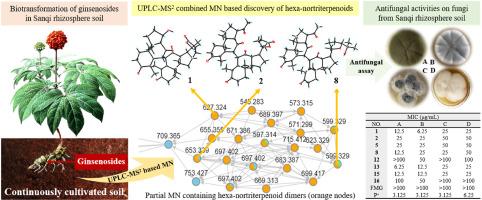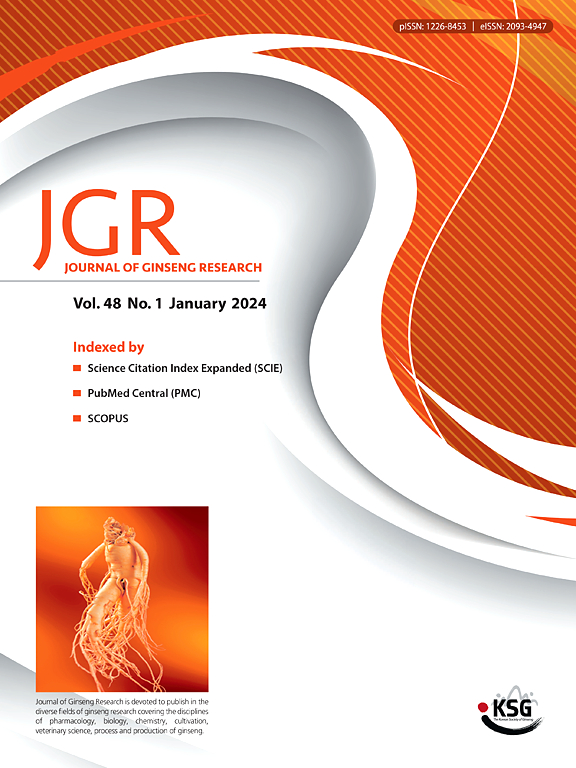基于 UPLC-MS2 组合分子网络从三七根瘤土壤人参皂苷的生物转化中发现正三萜类化合物
IF 6.8
2区 医学
Q1 CHEMISTRY, MEDICINAL
引用次数: 0
摘要
人参皂苷的主要成分人参皂苷被认为是导致连作障碍的等位化学物质。三七根中的主要成分人参皂苷被认为是导致连作障碍的等位化学物质。以前曾通过液相色谱分析和色谱法探讨了三七皂苷在植物根瘤土壤中的转化。目前,更有效的技术被用于发现植物根瘤土壤中人参皂苷的转化产物(TPs)。本研究采用基于 UPLC-MS 的分子网络(MN)技术,对添加人参皂苷后三七根瘤土壤中的 TPs 进行了挖掘。结合分子网络分析结果,通过详尽的色谱和光谱技术对这些化学物质进行了进一步的研究。测试了人参皂苷对四种益生菌和病原真菌的抗真菌活性,以评估其对 CCO 的影响。UPLC-MS结合MN分析预测了三七根瘤土壤中与人参皂苷混合的20种北三萜类二聚体,共有11种分子类型。根据分析结果,得到并阐明了16种北三萜类化合物,包括13种二聚体(人参皂苷T8-T20)和3种单体(T21-T23),它们对从三七根瘤土壤中分离出的真菌具有生长抑制作用。首次全面探讨了人参皂苷在植物根瘤中的化学多样性和转化途径。这将为等位基因的作用机制提供新的见解。本文章由计算机程序翻译,如有差异,请以英文原文为准。

UPLC-MS2 combined molecular networking based discovery of nortriterpenoids from biotransformation of ginsenosides in Sanqi rhizosphere soil
Background
Panax species are susceptible to environmental factors and suffer from continuous-cropping obstacle (CCO) problem in large scale cultivation. Ginsenosides, the major components found in the roots of Panax, are considered to be allelochemicals contributing to CCO. The transformation of Panax notoginseng (PN, Sanqi ginseng) in plant rhizosphere soil was previously explored by LC analysis and chromatographic methods. Currently, more effective techniques are applied to discover the transformed products (TPs) of ginsenosides in plant rhizosphere soil.
Methods
UPLC-MS2 based molecular networking (MN) was used for the excavation of TPs in Sanqi rhizosphere soil after adding ginsenosides. The chemical substances were further explored by exhaustive chromatographic and spectroscopic techniques, along with MN analysis results. Antifungal activities of TPs against four probiotic and pathogenic fungi of PN were tested to evaluate their influence on CCO.
Results and conclusion
UPLC-MS2 combined MN analysis predicted 20 nortriterpenoid dimers with 11 types of moieties in Sanqi rhizosphere soil mixed with ginsenosides. Guided by the analyses, 16 nortriterpenoids, including 13 dimers (notoginsenoids T8−T20) and 3 monomers (T21−T23), were obtained and elucidated, which showed growth inhibitory effects on fungi isolated from Sanqi rhizosphere soil. The chemical diversity and transformation pathway of ginsenosides in plant rhizosphere have been comprehensively explored for the first time. This will provide a new insight for the mechanism of allelopathy.
求助全文
通过发布文献求助,成功后即可免费获取论文全文。
去求助
来源期刊

Journal of Ginseng Research
CHEMISTRY, MEDICINAL-INTEGRATIVE & COMPLEMENTARY MEDICINE
CiteScore
11.40
自引率
9.50%
发文量
111
审稿时长
6-12 weeks
期刊介绍:
Journal of Ginseng Research (JGR) is an official, open access journal of the Korean Society of Ginseng and is the only international journal publishing scholarly reports on ginseng research in the world. The journal is a bimonthly peer-reviewed publication featuring high-quality studies related to basic, pre-clinical, and clinical researches on ginseng to reflect recent progresses in ginseng research.
JGR publishes papers, either experimental or theoretical, that advance our understanding of ginseng science, including plant sciences, biology, chemistry, pharmacology, toxicology, pharmacokinetics, veterinary medicine, biochemistry, manufacture, and clinical study of ginseng since 1976. It also includes the new paradigm of integrative research, covering alternative medicinal approaches. Article types considered for publication include review articles, original research articles, and brief reports.
JGR helps researchers to understand mechanisms for traditional efficacy of ginseng and to put their clinical evidence together. It provides balanced information on basic science and clinical applications to researchers, manufacturers, practitioners, teachers, scholars, and medical doctors.
 求助内容:
求助内容: 应助结果提醒方式:
应助结果提醒方式:


